We’ve had the bad and the ugly, the good and the nearly good, so now it’s time to get to the business end of our Celtic Managers Ranked! list. Recalling, of course, that Maley, McStay, McGrory, and Jock Stein (who we’ve already proclaimed as the GOAT) don’t qualify on account of existing only in black and white sepia-tinge. Here’s numbers five to one.
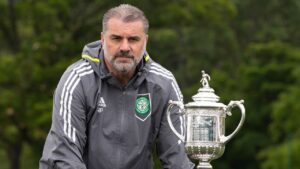
- Ange Postecoglou (2021-2023)
If Ronny Deila was the unlikeliest of all post-millennium appointments (see part two), then Ange Postecoglou was also a serious contender for that title. Unlike Deila though, Postecoglou had pretty much seen and done it all beforehand. Just not in Europe, which prompted some initial concern and skepticism amongst the support (this writer included). He’d guided the Australian national team to the World Cup finals, won the Asian Cup, and also had A-League and J-League titles tucked away in his managerial swag bag. Enough of a pedigree to hit the ground running and wrest the initiative back from Rangers, surely? Which, after the nightmare that was season 2020/21, was all we really wanted and all we could realistically ask of any new manager. And mate, did he ever pull through for us on that. A first season title-winning Double was immediately backed up by a second season Treble, a world record eighth Treble no less, and it was business as usual once again at the summit of Scottish football. Not only did Postecoglou restore the winning mentality after the despair of Neil Lennon’s final term, he also gave us Ange-ball – a high pressing, high tempo, dynamic style of football not seen at Celtic Park for many a year. He didn’t put a foot wrong in the transfer department either, recruiting Kyogo, Maida, Hatate, Carter-Vickers, Jota, Johnston, et al, all for very reasonable money in today’s market. Loved by the fans for his straight talking and carefully managed “bloody good bloke” everyman persona, Ange sadly blotted his own copybook by leaving with the job half done. Looking at the bigger picture: his European progress, or improvements, and returns, were negligible. When perennial EPL flops Spurs flashed a bit of boob and thigh in his general direction, his head was turned faster than a sex-starved post-pubescent Bondi lifeguard on a hot summer afternoon in Sydney. Some lives deserve saving. Others, not so much. Thanks Ange, you did great, but you could have done a whole lot more.
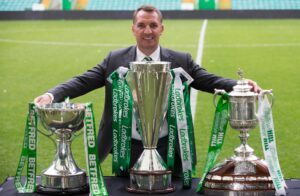
- Brendan Rodgers (2016-2019, 2023- )
Speaking of those who veer a little too easily toward distraction, we give you our former and yet newly incumbent manager, Brendan Rodgers. Let’s start at the beginning and state the bleeding obvious: Brendan Rodgers is a proven winner in Scotland. Seven domestic trophies available during his first spell at Celtic, seven domestic trophies duly lodged in the history books. His first two terms kick-started an eventual quadruple Treble and allowed us to start dreaming of something-in-a-row. Not forgetting the pure joy of an incredible “invincible” season. Hard to fault any of that, yet it all seemed light years away after Celtic lost to a pub team from Gibraltar in Rodgers’ first competitive game in charge. And in many respects, like Ange’s Celtic, it is in the European arena where Rodgers really failed to meet the demands of the support. Beyond continuing our domestic domination, which must be his first priority regardless, Rodgers surely has unfinished business in the European domain; one win and eight defeats in twelve Champions League group stage matches across his first two seasons, followed by a failure to qualify for the group stages in his third (truncated) season. Which ultimately ended at the Europa League last 32 stage (and defeat to Valencia). There’s the rub, and whilst Rodgers clearly has what it takes to win in Scotland, and the squad to achieve it – he’s inherited a belter from Postecoglou – he will only fully win back the trust of the support if he takes things to the now almost mythical “next level”. It hurt when he upped and left for a mid-ranking EPL club, but what really sticks in the craw is the manner of his departure. Who leaves in the middle of a title run-in? That will stay with us, and patience will be thin if it all goes belly-up sooner rather than later. The only way he can elevate his standing on this list is by achieving success in Europe. What does that actually look like? Let’s start with regular participation in the knock-out rounds of the Champions League, or at worst, winning one of the lesser tier European trophies. And failure domestically doesn’t really bear thinking about. Who said we were a demanding bunch?
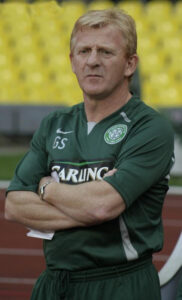
- Gordon Strachan (2005-2009)
This will perhaps surprise a few people. Especially since wee Gordon Strachan was not universally popular with the support, for reasons most likely associated with his niggly reputation as an opposition player. But there’s a few facts to support our ranking of Strachan at three on this list; unlike those immediately below him, Strachan can claim a decent level of progress in Europe during his four-year tenure, which actually began on a worse footing than that of Rodgers, with a 5-0 loss to unheralded Euro-lightweights Artmedia on his debut outing. A defeat he almost turned on its head in the return leg, but not quite. From there it was all about scaling new heights: for two consecutive years – 2007 and 2008 – for the first and only times since group stages began in 1993, Celtic made it beyond the groups and into the knock-out stages of the Champions League. In fact, after beating Manchester United in the 2007/08 group stage, it was only a narrow extra-time defeat against eventual winners AC Milan in the round of 16 that denied Celtic a place in the quarter-finals for the first time since 1980. The following year, Strachan’s Celtic avenged that defeat by beating Milan in the group stages before eventually falling to Barcelona in the round of 16. Heady stuff when compared to what went before and what we’ve seen since. Domestically, Strachan’s Celtic won three titles on the bounce, plus three domestic cups, across his four seasons in charge, losing his quest for 4IAR in his final season when Rangers claimed the 2009 title by four points. If Strachan can be faulted it was because more generally – beyond the brilliance of Nakamura – his signings were mostly hit and miss. And his often less than exciting, more pragmatic style of play did attract criticism from the more purist elements within the support. But on the whole, Strachan did a great job at Celtic, and his relative success in Champions League terms is all too readily and frequently overlooked by those who didn’t really fancy his style. What would we give for Champions League knock-out football next season?
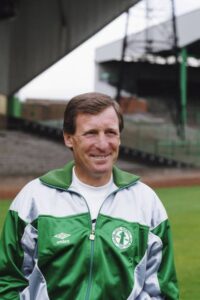
- Billy McNeill (1978-1983, 1987-1991)
When Billy McNeill returned to Celtic to replace Jock Stein in 1978, the club faced one of the biggest transition periods in its history. Celtic had finished a low ebb distant 5th in Stein’s final season and McNeill had his work cut out if he was to emulate his glorious playing career as manager of the club. Rangers had just won its second Treble in three seasons and Celtic were desperate for a return to the summit of Scottish football. Quite aside from dealing with Rangers, McNeill’s task was exacerbated with the rise and rise of both Aberdeen and Dundee United during his first spell in charge. At various points, each club proved to be a formidable fly in the ointment, and in truth, Rangers were very much an afterthought during this period. McNeill won the league in his first season when ten-man Celtic beat Rangers 4-2 to clinch the title. An equally famous 1-0 extra-time Scottish Cup final victory over Rangers followed in 1980, before Celtic claimed consecutive titles in 1981 and 1982. Big Billy had returned Celtic to its rightful place, but the title was relinquished the following year on the final day – despite another 4-2 win over Rangers – with Dundee United claiming the spoils by a single point. By this point, McNeill’s relationship with chairman Desmond White was proving fractious, which ultimately led to his exit. Or rather, his temporary exit, and it can only have been a genuine love for the club that convinced McNeill to return to the Celtic role in the summer of 1987, because by this time, the cracks in the club’s off-pitch infrastructure were laid bare for all to see. Which made his double-winning exploits in the 1987/88 centenary season all the more miraculous. Those cracks were further papered over with another Scottish Cup win in 1989, but after two trophy-less seasons which included a painful Cup final defeat against Aberdeen on penalties, and the re-emergence of big spending Rangers, McNeill was gone again by 1991. That’s when the proverbial dark stuff really hit the fan. Despite managing Celtic during nine seasons of rapidly deteriorating financial stability at the club, his trophy haul of four league titles and four cups speaks volumes about his status. Bonus points for being the greatest on-pitch leader of men the club has ever seen. This is one of the few Celtic lists he’ll ever rank second on. R.I.P. Caesar (died 2019).
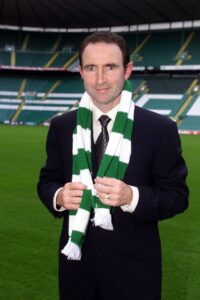
- Martin O’Neill (2000-2005)
In the six years following Fergus McCann’s arrival at Celtic in 1994, the club won just one league title, one Scottish Cup, and two League Cups. In the five years pre-McCann the trophy count had been a big fat zero. Four trophies in 11 years did not make for a particularly happy fanbase. Within 12 months of Martin O’Neill’s arrival in the summer of 2000, that trophy count had nearly doubled with his arrival being the catalyst for a magnificent first season Treble. The league was won by 15 points, after a barely fathomable 36-point swing over Rangers from the prior season. With a pulsating 6-2 win in his first Old Firm match, his impact was instant, and I can safely say that the 2000/01 season was the most enjoyable year of my own Celtic-supporting lifetime. The following season O’Neill’s Celtic won the league by 21 points, amassing 103 points in total. A year later he led the club to its first European final in 33 years. In 2004, his team beat Barcelona on route to another European quarter-final, won 25 consecutive matches, and won the league by 17 points. By 2005, O’Neill’s personal circumstances had changed dramatically, his team desperately needed a refresh, and his time at Celtic had run its course. But the damage the Northern Irishman inflicted on the psyche – and payroll modus operandi – of our bitterest rivals changed the course of Scottish football, with its impact still being felt today. O’Neill’s transfer dealings were mostly sound, if not occasionally exceptional. Five years, three league titles, with two titles lost only on the final day – by one goal in 2003, and one point in 2005. Throw in four cups, and an unprecedented 75 percent winning record – the best of all Celtic managers, including Jock Stein – and he more than qualifies as our best manager since Stein. He walked the walk, and when the time came, after lifting a consolation Scottish Cup in 2004/05, O’Neill walked away a genuine hero.
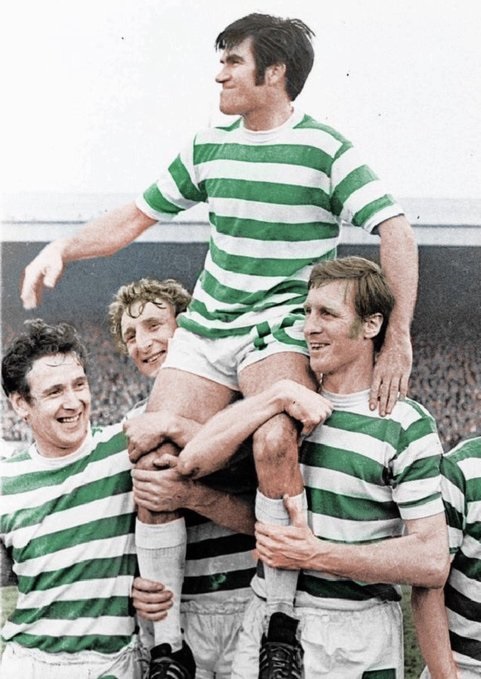
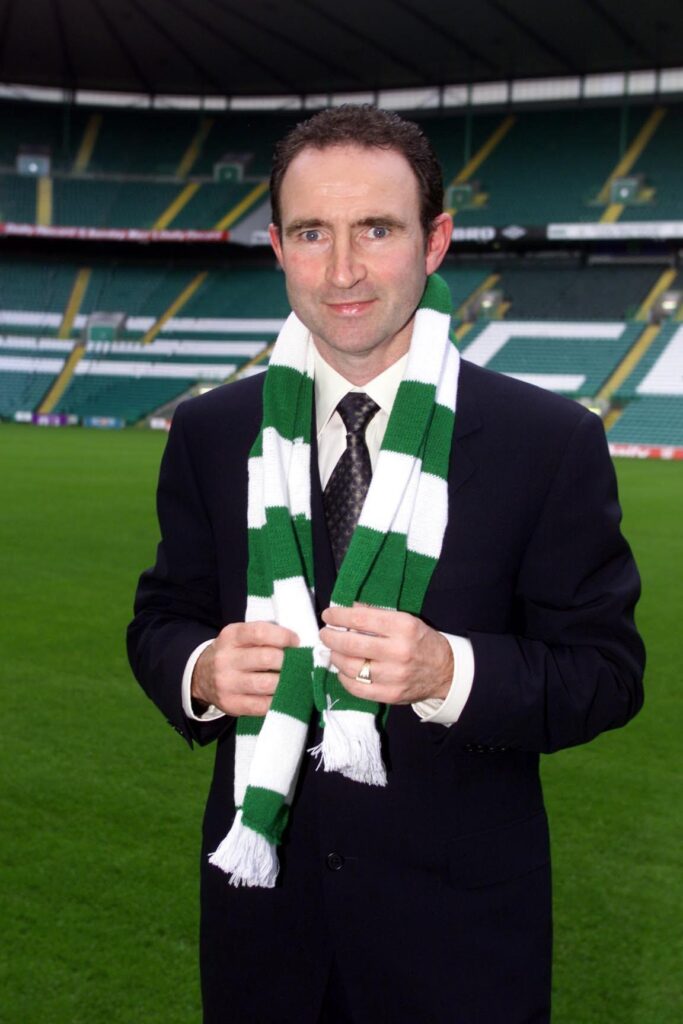
Probably Big Billy too high but at least he did not walk away like Ange and Brendan. Come to think if it neither did Neil Lennon but the Irish are not everybody’s cup of tea even, surprisingly, at Celtic. The centenary year Championship was very important though.
I thought Billy ‘walked out’ the first time round to Manchester City, no doubt due to entirely understandable frustrations with our custodians.
Yes of course he did, forgot that. Before my time in Scotland. Still a legend and like Brendan first time victim of Board. In fact weren’t they’ all until Ange?,
Wow! Mojo back! Respect to BJF, but as in all things footie. we all have thoughts. To my simple thinking, McNeill and Bren had the impossible job, putting it together regardless of the greatest opposition, their own board. Already Lawwell has balanced the books and raised the 30 millions promised to Bren, who was an ass for leaving early, by selling Jota after leaving Bren tearing his hair out after selling Dembele and not supporting his ideas. Jota going does leave us without a superb attacking talent, but their is so much to work with we’ll be fine against a struggling sevco. We shall see where this goes, but Bren is embarrassed so something to prove. Strangely, before Bren’s treachery his first, the invincible treble, was the one I did not want to end. McNeill and MON are statues, no more need be said. Strachan a pain who leaves me with a smile. Same with Ange, bastard, still stings as we all loved him. So etims back with a bang! 🙂 Defence without Carter-Vickers is weak so another centre-back needed, especially another crack at Europe coming, yes knock-out rounds exciting, but to actually win one of the lessers would be amazing without the funding for the big one, I so hope I am wrong and somehow the dream is achievable, bit over the next three years, if he stays, he simply must win three in a row and a European Trophy to have any chance of winning back the majority and even staying longer, which I doubt will happen. First up, flag-day! HH!
Ange would be higher only for him running to London and it’s still raw.
The passage of time has got Brendan his place. A few years ago, he’d not have featured as feelings were still raw.
Blessed Martin gave us back our self respect and so much more.
Hail, hail
Articles like this are subject to the author’s knowledge, experience, maturity and biases, especially recency as far as the latter is concerned.
I suspect most others would have a different take, which would, largely, be different from each other!
Ange “his head was turned faster than a sex-starved post-pubescent Bondi lifeguard on a hot summer afternoon in Sydney.” Is this why the author is no longer known as Aussie Mick? 😉
I’m sure he would have been 1 or 2, as little as 2 months ago, so should you lose your historical greatness, simply because you decide to move on? Yes, if you’re doing an emotional analysis and no, if you’re doing a rational one.
Brendan (I assume we’re back on capitalised first name terms again)
Similar to above, I doubt he would have made the top 10 and perhaps disqualified from participation only a couple of months ago.
We’ve probably done this to death but 1 more time, his European record was decent ie 2 qualifications for Champs League, including a 3rd place finish and EL KO, and the only tie he lost that we should have won was against AEK.
The opinion of fans is obscured by the tankings we took from Tier 1 sides and unfavourable comparisons with others but Lennon 2 showed how much had changed at that level.
The other issue is that he left when the league was 80% completed and in our pockets, with the agreement of Celtic, who pocketed £10m compo, more than enough to appoint a continuity successor. The fact this didn’t happen is on them not him.
Gordon My recollection is the almost unremittingly awful football, leading to a less than optimal Celtic Park.
I also debit him with sticking around for another season after Wally had found him out and would surely over take him without all the distractions of the 3rd one. That’s not sympathy for the devil just a realistic assessment of what was going to happen, which should have been clear to all.
I also think his non-Celtic record, whilst not as unremittingly dreadful as Lennon, was pretty underwhelming, so is that really great manager calibre?
As mentioned above, although his Euro record was good, it was “then” and its so much harder now.
Billy I suspect there is major bias here and why would there not be, given he was the captain of the immortal Lions?
There’s no doubt that the early years of the 1st term and the Centenary season were great but there was always a feeling of unfulfilled potential, I think there was a couple of big league leads lost and the League Cup Final loss to the Huns in 90/91 were horrendous.
Of course our malignant custodians bear the major responsibility for us failing to kick on.
Martin There’s no doubt that he was the (original) Huns killer. The 1st season in particular showed that everything had changed utterly and a terrible (for the Huns) beauty had been born in Scottish football.
Having said that, there was almighty failures as well, McLeish doing an Ange in his first 2 seasons (seriously?) and the utter wretchedness of losing the league in 2005.
It also has to be noted that for all the celebration of Seville, it happened due to a horrendous failure against Basle and at the cost of a Hun Treble.
Forbye that, we genuinely went toe to toe with the best in Europe at Celtic Park and the first campaign in particular was extremely unlucky, amassing 9 points against recent champs Juve and soon to be Porto.
Test
I agree
No-one can underestimate the size of the job facing O’Neill at Celtic, given that Rangers were spending fortunes and had won 11 titles in the previous 12 years. We had beaten them just 3 times in the previous 26 games and seemed intimidated too often in those matches. He shifted the whole dynamic, made Celtic the dominant side and put the skids under them. We could easily have had 5 in a row under him and certainly should have won at least another title. Rangers got lucky for some of the success they had when O’Neill was at Celtic but that’s all it was. You never felt the tide was turning back in their direction. In Europe, he made Celtic park a fortress, where even the best sides in Europe struggled to get any kind of result. 3 years unbeaten there in all competitions, wins over Barca, Juve, Porto and Valencia. O’Neill shaped Celtic for the 21st century, no doubt about it.
Some interesting stuff and lots of memory joggers but personally I don’t agree with nor understand why folk have to pigeon-hole and prioritise things and people and infer what they say holds water. It doesn’t. It’s nothing more than opinion as it’s impossible to compare individuals without knowing what influences/pressures they were under and a whole lot more e.g. financial backing. Suffice it to say that, like players, we’ve had managers from the mediocre to the awful to the sublime. I just hope Brendan’s return proves to be one of the latter.
In any event, thanks for taking the time to do this.
Would Martin have been as successful without Larson?
Why does Martin look like a beyond insane psychopath in that photo?